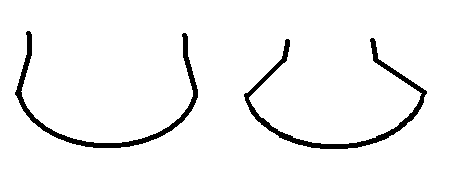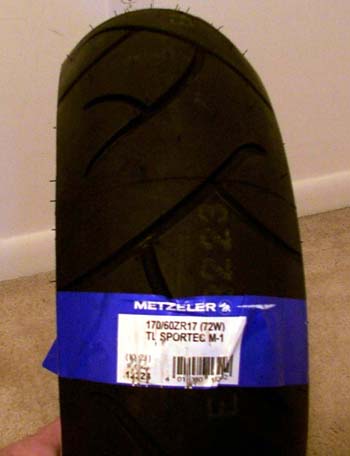| Author | Message | ||
Blake |
Kevin: Yes, the rear PM is 5.5" wide, where the basic stock rear rim is 5.0". The fender is not a problem in either case. | ||
Kevinhern |
Thanks Blake. | ||
Johnnybravo |
i even put a 180 on my stock painted rim, works like a charm | ||
Blake |
I think that there are a few (maybe just one?)manufacturers that make a 180/55 rear tire for a 5" rim. Putting a 180/55 rear tire made for a 5.5" rim onto a 5" rim will distort the tire's profile resulting in less than optimum performance and longevity. Probably not a big deal if you don't ride aggressively. I have to admit, big rear rubber does look cool. | ||
Johnnybravo |
my 180 fits fine no distorting at all, but the tech i work with gave me hell about putting it on. | ||
Blake |
Johhny: "No distorting at all." How can you possibly know that??  | ||
Blake |
This is VERY exagerated, but maybe it will help explain the issue. Note that sidewall geometry very much affects a tire's performance as well as tread profile.  Which tire would be more stable? | ||
Johnnybravo |
You have a point but the side walls are like the one on the left but then again i just got my heads back and put on so i'll tell you in a few days if the handeling is terrible or not | ||
Blake |
Johnny: Like I alluded to originally, you won't notice a difference unless you are comparing lap times at Laguna Seca. In your case you are only looking at a total of 1/2" from optimum, 1/4" on each sidewall. I simply wanted to illustrate that some level of distortion will occur. | ||
Spike |
Quick question: How critical is it to balance new tires? I've never balanced any of my motorcycle tires before, but I've also never had a bike that handled as good as the Buell. I need to change the tire in the next two weeks (before daytona) and I don't plan on balancing it if I don't have to. Thanks in advance. Mike L. '99 Cyclone | ||
Hans |
Quick answer: NEVER ride with unbalanced tires. Hans. | ||
Blake |
Spike: I agree with Hans except I would say "imbalanced." What I mean is that you can have an "unbalaced" wheel that is in perfect balance. "Unbalaced" does not necessarily mean your wheel is "imbalanced." Along that line of thinking, I rarely opt for rebalancing of my wheels upon fitment of new tires. The only time I do is when I switch tire models/brands. Why? The typical static balancing performed by motorcycle shops has little to no correlation to your wheel's dynamic (inertial) balance. A statically balanced wheel can easily be grossly imbalanced dynamically and vice versa. Static balancing is pretty much an act of faith just as is leaving in place the same wheel weights for a new tire install. If the new tire is the dame make/model and the tech installs it with with the light spot (indicated by a yellow dot) at the valve stem, just like the old tire, then the likelyhood of having an imbalance problem is small. If you notice a problem, take the wheel back and get it dynamically balanced. Simple enough? | ||
S2rider |
Blake, I would never say you were wrong, but I will share a little non-scientific test we ran at MMI back in 1988. We took 20 wheel assemblies from various bikes and balanced them all on a bubble balancer. When we were done, we balanced all of them on two different brands (Snap-On and Coats) of dynamic balancers. The results? One wheel showed on one balancer (but not the other) that it was 1/4 oz out of balance. All others showed no difference. What does it all mean? We wasted a lot of time balancing a lot of wheel assemblies. Randell | ||
Bull |
Quick Q: Is it possible to fit a Sportmax 180 instead of the original 170 without sprocket spacers?? Will this lower the bikes handling performance? The bike's a M2'99 and I have the Marchesini (?) cast wheels. Thanks/ Jojje | ||
Chrisg |
Does anybody have any info/experience on wheel bearing failure in Marchesini wheels, or changes to the wheel bearings? Reason I ask: rear wheel bearings on my 2000 M2 failed at ~25,000 miles. Probably my fault for overtight belt tension. Take it to buell dealer, replaced with buell parts. 3 weeks/1300 miles later, rear wheel bearings fail again, inexplicably. Added wrinkle: when the dealer ordered the bearings for the first replacement, the part number in the parts book had been superseded in the computer. When they replaced them the second time, the superceded part number had been superceded again. The dealer and the tech who did the work both times seem sharp and have treated me well, so I have no reason to suspect improper installation. Which leaves the question: why did the bearings fail after only 1300 miles? Were the changing part numbers simply a change of suppliers due to cost or availibility, or was there a quality issue? Any thoughts, but particularly other experiences with unexplained bearing failure would be appreciated. | ||
Johnnybravo |
any one know how to get the slick crap off new tires, i just got new tires an they are a little slick. | ||
Blake |
Chris: What type of bearing failure did you find? Did the outer races spin within the wheel's hub or was the failure specific to the bearing itself? Spinning of the outer races I have heard of. Failures of the bearing itself in only 1300 miles/ 3 weeks would surprise me though. JohnnyB: Ride gingerly and get 'em scrubbed in gradually over 50 miles or so. Or get one of the pre scrubbers like the racerboys have. | ||
Sportyeric |
For the do-it yourselfers, here's a link to a home made tire changer that I came across on the XL List: http://www.clarity.net/~adam/tire-changing-doc.html Hope I'm not repeating old news. I haven't spent any time on this thread.( Bias ply tires and all.) | ||
Ara |
Johnny: Use a section of medium sandpaper conservatively, and you can scuff in your new tires without that first-ride risk. Russ | ||
Ralph |
I use alcohol to get the mold release off. If I want them scrubbed in I use a electric grinder with coarse paper. I grind a touch off the tire while I spin the wheel. Russ, I guess you could say I'm not conservative. bighairyralph | ||
Bull |
Quick Q: Is it possible to fit a Sportmax 180 instead of the original 170 without sprocket spacers?? Will this lower the bikes handling performance? The bike's a M2'99 and I have the Marchesini (?) cast wheels. Thanks/ Jojje | ||
Ocbueller |
Sportyeric, Nice link,thanks. SteveH | ||
Blake |
Bull: It is unwise, and no reputable tire professional will recommend that you force a 180 series tire made for a 5-1/2" rim onto a 5" rim. They will tell you to stick with the 170/60 or to find a 180/55 that is made specifically for a 5" rim (if there are any). A too narrow rim will deform the intended tire profile and put the sidewalls at an improper/non-optimum orientation. This can cause higher than normal tire temperatures and treadwear. Your handling can also suffer. Why is everyone so gaga over a slightly wider tire? That said, the answer to your question is... yes a 180/55 will fit on your stock 5" wheel. I have no idea what you mean by "without sprocket spacers." You will need to assemble the wheel/axle/sprocket as per normal including the requisite spacers. | ||
Chrisg |
Blake, In both instances it was the bearings themselves that failed, not spinning in the hub. It sure surprised me too when the replacement set failed after 1300 miles. (Actually only the outer two bearings failed the second time, not all three). My dealer's working with Buell to get a good will warranty for the second repair, but even if that works I'm out $100 for the good-will fee. The changing parts number bussiness makes me suspect Buell switched to a cheaper bearing supplier, had quality issues, than changed again. I just don't want to be left holding the bag. | ||
Bull |
Thanx Blake, Just the information I needed... By the way, sprocket spacers: to move front and rear sprocket slightly to the right in order to gain clearance between the tire and the belt! And I'm not gaga over a slightly wider tire, my tire-dealer is offering a 180 for half the money;-) /Jojje | ||
Henrik |
Brake rotor removal: Well, I wanted to save the original S2 rotor and replace it with the Y2K version. Got the front wheel off as part of the whole steering head bearing project, so I went to work on the countersunk allen head bolts holding the old rotor: 1: soaked the bolts in "liquid wrench" for 24 hours. 2: dimpled the top of the bolt with a center punch to try an loosen up the grip and to firm up the fit of the allen socket in the bolt. 3: Went to work with an electrical impact wrench 4: tried with an impact driver 5: tried heating the bolt with a pencil torch before attacking it with the impact wrench again. Of course nothing budged  What other options would you suggest? Wheel bearing status: I checked the front wheel bearings and one side seem to turn a little snug - it could be because of "tension" from the spacer between the bearings. No feeling of looseness or "grinding". Seems like there is still grease in the bearing. Would you leave them alone or go ahead and replace? I have the replacement bearings, but wouldn't mind getting another 10,000 miles out of the current bearings if possible  There is not much of a lip between bearing and spacer btw. I'm not even sure I could get enough grip with my 3-hook bearing puller. Henrik | ||
Spike |
This gets mounted tomorrow:  Two thumbs up for discountmotorcycletire.com. I placed the order on Thursday, the tire was here when I came home from work today. A 170/60R17 Sportec M-1 was $120 shipped. Just for reference, MAW has the same tire for $124.95 before shipping. Mike L. '99 Cyclone | ||
Hans |
Henrik, What about heating the rotor and cooling the bolt (Liquid N2 ?) to enlarge the hole and to shrink the bolt ?? Hans. | ||
Mark_In_Ireland |
Henrik, I had to weld bolts onto the heads of the screws, this gives you the leverage required to loosen them. They were tight all the way out. I know some people have had it easier but my Buell was sent here as punishment for something I did in an afterlife!!!! | ||
V2win |
Henrik, This will sound a bit rough, but it works. Take one heavy duty brass punch and one heavy hammer and after making sure the wheel is secure on a solid surface, hit the top of the bolts very hard two times. Im not talking any sissy stuff here. HIT THEM HARD. This should break the hold the loctite has and they will screw out easily. If you cant bring yourself to do that then heat is the other way to go. Change the bearings. Its worth the piece of mind. |